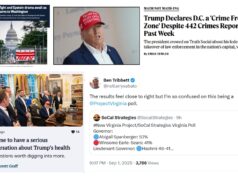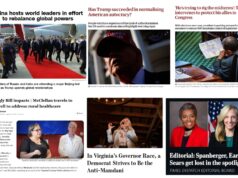I had a chance to sit down Thursday with Sam Bleicher, an adjunct professor of law at Georgetown University in Washington, D.C., who from June 2014 to November 2018 was a member and vice chair of the Virginia Air Pollution Control Board before being removed by Gov. Northam “less than a week after they raised concerns about a natural gas compressor station planned for a historic black community in Buckingham County and ahead of the board’s vote on the project.
Bleicher is now out with a mystery/suspense thriller/science fiction novel, “The Plot to Cool the Planet,” which he and I discussed on Thursday, along with the climate crisis in general. See below for some highlights from that part of the discussion, and here for our discussion of Virginia-specific issues (e.g., Dominion, the pipelines).
Finally, see here for a podcast interview with Bleicher about his novel, which is described accurately as “timely” and “fascinating…not only whodunit but why…craft[ing] this great story around an issue that’s so real…a combination of a murder mystery on one side and the effort by some diplomats to circumvent normal procedures and get something done about climate change.” One major point that Bleicher made in the podcast was that scientists tend to present things in such a cautious, careful way that “the message has been lost that we face a crisis for humanity as well as all the other species on the planet…I thought a novel might get [people’s] attention in a different way.” Let’s hope!
- Bleicher: “As you know, the book starts around 2020 and it runs to 2025. That was by design, because I didn’t want to write another dystopian end-of-the-world book. Now, I’m not saying the destruction of human and animal life as we know it isn’t going to happen… but I’m not saying it IS going to happen either.”
- Bleicher: “…the extinction of a million species and the loss of agricultural productivity and…then what will happen? People will try to migrate and there’s no place for them to go. I mean if the million people, maybe ten million people, who live on the coast of Bangladesh want to go inland, where would they go that’s viable open space? Nowhere. ”
- Bleicher: Climate disruption is “a serious, threatening situation. The Defense Department ironically is the one branch of the government that seems to really get it. They understand this will generate conflicts and wars – civil wars, international wars, and failed states, and those have serious consequences.”
- Bleicher: “The scientists on the UN Intergovernmental Panel on Climate Change (IPCC), I guess at first they just thought, well, we will explain to everybody what needs to be done, and people would just do it.”
- Bleicher: “The missing link in most of the conversation [is that] society has invested money, massive resources in our current system – trillions really – and not only trillions that are just plain sunk costs, but trillions that they have invested to generate more revenue in the future.” (I noted that economists call these “stranded assets”).
- What motivated Bleicher to write this book right now? “I’ve been teaching about climate change, mostly in China actually, for the last several years. The interesting thing is when you tell young people anywhere about this problem, they’re all ears, they want to know about it, they want to know what the threat is…”
- Bleicher: “So I have been studying this, and in recent years the more I read about it, the more distressed I’m getting. Of course we now have a government that’s going backwards. A friend who just read the book sent me an email the day after [Secretary of State Mike] Pompeo’s statement [about the melting Arctic opening up more opportunities to drill for oil in the Arctic] and said, ‘it’s your book, except it’s Pompeo, not Putin talking’.When you wonder about Russian influence over the President and then listen to a speech like that, you say, where is that coming from? That’s not coming from the bureaucracy, that’s not coming from the New York Times, that’s not coming from public opinion, that’s coming from the folks who have a vested interest in developing the Arctic. So who’s that? Russia and the fossil fuel industry.”
- Bleicher: When it comes to climate communication, people “are not being reached. Unless you’re a student of science and unless you take the time to piece through pages and pages and pages of the reports, you don’t get the message; you just get the idea that some bad things might happen. Al Gore’s movie made a difference, his Climate Reality Project is educating a lot of people, but they can’t seem to educate Congress…”
- Bleicher: “I have this dream that maybe after primary season is over next spring, some of these Republican Senators and Congressmen will finally do some rational things when they’re no longer faced with a threat of a primary. What I keep reading is they’re all terrified by the fact that Trump will support a primary opponent against them and they won’t make it through the primary…they don’t want to attract that money against them.”
- Bleicher: “I heard a presentation by a reputable government scientist whose name I can’t remember now, saying, ‘why aren’t we doing simple things like painting all the roofs white and white highways instead of black highways… sounds silly but those things could make a difference.’ ”
- On geoengineering, Bleicher said that one of the things that he wanted to bring out in the book was that “engineers created this problem” so “they have to fix it…They already remade the climate and the planet when we started making artificial fertilizers.…that changed everything. The Green Revolution was an artificial engineering concept that doubled the earth’s population.”
- [I mentioned that when I first started at the Energy Information Administration in the late 80s/early 90s, I was playing with spreadsheets, looking at China and India to see what their energy consumption and carbon emissions would be if they moved towards our per capita consumption, and basically, we’d need like five planet Earths.] Bleicher agreed that this is not even close to sustainable, not just for energy but for many other resources.
- Bleicher recommended using phrases like “climate disruption” rather than the more anodyne “climate change” or “global warming.” These standard terms are not arousing the public to insist on action and to accept dramatic changes.
- According to Bleicher, the climate crisis is multifaceted, but his book focuses on heating up the planet, which is causing most of the others. That one problem, melting the glaciers, is “irreparable…that by itself is enough to say we need to do something now.”
- Bleicher pointed out that methane emissions are a huge problem, but they haven’t been properly modeled – “methane in the atmosphere is 80 times more powerful than CO2, and it turns out that we’re emitting two or three times more methane than we thought…natural gas is a bridge to nowhere.”
- I said I was concerned that if we move towards geoengineering, one danger is that we (incorrectly) feel like we’ve got more time to solve the climate crisis. According to Bleicher, “nobody who’s interested in and looks honestly at solar geoengineering is saying that…It doesn’t address ocean acidification, among other impacts of increased carbon in the atmosphere, and we don’t have more time no matter what we do.”
- Bleicher’s says his view on geoengineering “is summarized in his novel where the three engineer types are talking about whether they should actually go ahead with the project and one of them says, ‘No, we don’t know nearly enough, we don’t know what we’re doing; it’s like medicine, we don’t know the dosage. We can say yeah, in principle it works, but how much? We don’t know and there’s no way to find out.’ Yes, we could probably do several years of various subtle experiments and get a better idea, but we haven’t got several years… Another one of the three answers, ‘We would never give a vaccine to a healthy child on the basis of what we know, but we aren’t dealing with a healthy child, we’re dealing with an earth that is dying…a planet that is fatally sick, and we’ve got to do something now.’”
- Bleicher said he really gets more concerned about doing something immediately with every new report that comes out…The models assume a smooth progression to 2100…not really focusing on interim consequences…society will collapse before we ever get to 2100 at the rate we are going.”
- So does Bleicher think that we need to do something drastic basically ASAP? “Yes, that is my personal view.”
- So what are the options to do that? “Well, it’s hard to know how fast you can do it, but what you can start by saying is we’re not going to allow any more investment in fossil fuel production, generation, consumption – no new facilities…” And look at ways to redirect those investment resources to transforming transportation, agriculture, and building design, along with new renewable energy facilities.




![Monday News: Trump’s Lunacy Pushes China, Russia, India, etc. Together; “Happy Labor Day. Donald Trump and Elon Musk Are Screwing Workers.”; “Where is the [media’s] intense focus on Trump’s failing health?”; ““Trump says he is not a dictator. Isn’t he?”](https://bluevirginia.us/wp-content/uploads/2025/09/montage0901-238x178.jpg)









